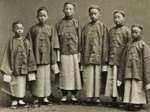Tuesday, March 15, 2011 | 5:30 PM EDT - 5:30 PM EDT
Some 130,000 students from China now study a variety of fields in colleges and universities around the United States. What about the first Chinese students in this country? In a lecture and discussion at the Luce Foundation offices in New York, Edward Rhoads shared stories and research from his new book Stepping Forth into the World: The Chinese Educational Mission to the United States, 1872-81, which examines the individual and collective histories of the first 120 Chinese students in the United States.
A project of the self-strengthening movement during the late Qing dynasty, the Chinese Education Mission dispatched these students – some as young as 11 years old – to gain technological expertise in the American education system. They served as early ambassadors to the United States, lived with host families throughout New England, and many attended college at some of the nation’s most elite universities. The program was abruptly ended in 1881, sending most of the scholars into positions in the Chinese civil service. Though some of the “CEM boys” had difficulty reintegrating into Chinese society and earning professional advancement, they remain pioneers that paved the way for the many Chinese students in the United States today.
This fascinating tale of one of the first meetings between East and West presents not only Chinese history, but also the history of U.S.-China relations and of Chinese in America. It documents the struggle the students faced to preserve their culture, heritage, values and beliefs while attempting to integrate into their adoptive homeland.
Until his retirement in 2003, Dr. Rhoads was a professor of Chinese history at the University of Texas at Austin. His research interests include the late Qing and early Republican eras, and the history of the Chinese in the United States. His book, Manchus and Han: Ethnic Relations and Political Power in Late Qing and Early Republican China, 1861-1928, was awarded the Joseph Levenson Prize in 2002 as the best book on twentieth-century China by the Association for Asian Studies. His current project is a history of the bicycle in China. Dr. Rhodes is a longtime member of the National Committee.
Speaker Bio
Edward Rhoads was born in January 1938 in Guangzhou, China, on the campus of Lingnan University (his father was an English professor and his mother was a native of Guangzhou). He spent the war years in China, first in Hong Kong and then in Chongqing, and the postwar years back in Guangzhou. At Lingnan, he attended both a Western school and a regular Chinese elementary school; he was in the fifth grade of the Chinese school when the Communists took Guangzhou in October 1949. He and his family left China in February 1951; they resettled in 1952 in Springfield, Massachusetts., where, in 1956, he graduated from high school. His early educational experiences hark back to those of the students of the Chinese Educational Mission 80 years earlier.
Rhoads received his B.A. from Yale in 1960 and his Ph.D. from Harvard in 1970, specializing in the history of modern China. In 1967, he started teaching at the University of Texas at Austin, from which he retired 36 years later in 2003. He spent two years in Taiwan (1965 and 1974-75) and one in China (1982-83, at People’s University in Beijing); in 2007, after his retirement, he also taught for a semester at Lingnan University, Hong Kong.
In addition to Stepping Forth into the World, Rhoads is the author of China’s Republican Revolution: The Case of Kwangtung, 1895-1913 (Cambridge: Harvard University Press, 1975) and Manchus and Han: Ethnic Relations and Political Power in Late Qing and Early Republican China, 1861-1928 (Seattle: University of Washington Press, 2000). The latter won the 2002 Levenson Prize given by the Association for Asian Studies as the best book on twentieth-century China. He has also published articles on the history of the Chinese in the United States, including ”The Chinese in Texas” (Southwestern Historical Quarterly, 1977), ”Asian Pioneers in the Eastern United States: Chinese Cutlery Workers in Beaver Falls, Pennsylvania, in the 1870s” (Journal of Asian American Studies, 1999), and ”In the Shadow of Yung Wing: Zeng Laishun and the Chinese Educational Mission to the United States” (Pacific Historical Review, 2005). His current research topic is a history of the bicycle in China.
He presently resides in Yonkers, NY.
